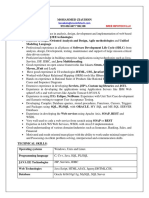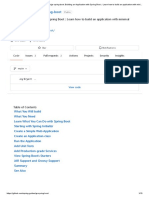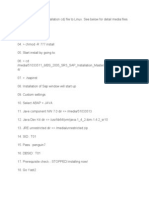0 ratings0% found this document useful (0 votes)
2 viewsFullStackJava Complete
The document outlines the essentials of Java Full Stack Development, covering both front-end and back-end technologies, as well as database management. It includes topics such as Java basics, data types, operators, control statements, exception handling, and advanced Java concepts like JDBC and Servlets. The course aims to equip learners with practical skills for building web applications using Java Full Stack technologies.
Uploaded by
techmahindra2076Copyright
© © All Rights Reserved
Available Formats
Download as PPTX, PDF, TXT or read online on Scribd
0 ratings0% found this document useful (0 votes)
2 viewsFullStackJava Complete
The document outlines the essentials of Java Full Stack Development, covering both front-end and back-end technologies, as well as database management. It includes topics such as Java basics, data types, operators, control statements, exception handling, and advanced Java concepts like JDBC and Servlets. The course aims to equip learners with practical skills for building web applications using Java Full Stack technologies.
Uploaded by
techmahindra2076Copyright
© © All Rights Reserved
Available Formats
Download as PPTX, PDF, TXT or read online on Scribd
You are on page 1/ 20
Introduction
• Full Stack Development is an essential skill in
web development, involving both front-end
and back-end.
• Java Full Stack development includes
building interactive user interfaces and
managing databases.
Full Stack Java Terminologies
• 1. Front-End Development
• 2. Back-End Development
• 3. Databases
Front-End Development
• Focuses on user experience using technologies
like HTML, CSS, JavaScript.
• Key skills: UI design, CSS preprocessors,
APIs, responsive design.
Back-End Development
• Handles server-side logic, authentication, data
management.
• Technologies: Java, Spring Boot, databases,
API integrations.
Databases
• Databases store and manage application data.
• Types:
• 1. Relational (MySQL, PostgreSQL)
• 2. NoSQL (MongoDB, Cassandra)
Java Basics
• Introduction to Java:
• 1. History of Java
• 2. Features: Platform Independence, OOP,
Multithreading
• 3. JVM Architecture
Java Data Types
• Primitive Data Types: byte, short, int, long,
float, double, char, boolean.
• Reference Data Types: Strings, Arrays, Classes.
Java Operators
• Arithmetic, Relational, Logical, Bitwise,
Assignment, Unary, and Ternary Operators.
Control Statements
• 1. Conditional: if-else, switch-case
• 2. Loops: for, while, do-while
• 3. Branching: break, continue, return
Exception Handling
• 1. try-catch-finally
• 2. Throwing Exceptions
• 3. Custom Exceptions
• 4. Checked vs. Unchecked Exceptions
Intermediate Java: Collections
• Java Collection Framework: List, Set, Map,
Queue.
• Key Classes: ArrayList, LinkedList, HashSet,
HashMap.
Intermediate Java: Multithreading
• Threads in Java:
• 1. Thread Class
• 2. Runnable Interface
• 3. Synchronization
Advanced Java: JDBC
• JDBC (Java Database Connectivity):
• 1. Connecting to Databases
• 2. Executing Queries
• 3. JDBC Architecture
Advanced Java: Servlets
• Java Servlets handle web requests on the
server.
• 1. Request and Response Objects
• 2. Session Management
Advanced Java: JSP & JavaBeans
• JSP simplifies dynamic web content
generation.
• JavaBeans are reusable software components
used in JSP.
Spring Boot Overview
• Spring Boot is used to develop microservices.
• Features: Auto-configuration, Embedded
Servers, Dependency Management.
Software & Hardware
Requirements
• Software: Java JDK, IDE (Eclipse/IntelliJ),
Database (MySQL/MongoDB).
• Hardware: Min 4GB RAM, 500GB Storage.
Course Overview
• Covers front-end, back-end, database
management, and project development using
Java Full Stack.
Annexure: Project Implementation
• Project Details:
• 1. Socket Programming
• 2. Client-Server Architecture
• 3. Exception Handling
Conclusion
• Java Full Stack development is a powerful skill
set for building web applications.
• This course provided hands-on experience
with key technologies.
You might also like
- IBM Enterprise Records-Java API For Records Management-Getting Started GuideNo ratings yetIBM Enterprise Records-Java API For Records Management-Getting Started Guide69 pages
- Venkata Sai Nirmal Kumar Meeshala - Java Microservices DeveloperNo ratings yetVenkata Sai Nirmal Kumar Meeshala - Java Microservices Developer8 pages
- Spring Boot, Spring Security, Spring MVC, Spring DI and Spring BatchNo ratings yetSpring Boot, Spring Security, Spring MVC, Spring DI and Spring Batch8 pages
- Bibi Noel: Core Java, Java, J2EE, UML, Angular JS, JSF, EJB, JDOMNo ratings yetBibi Noel: Core Java, Java, J2EE, UML, Angular JS, JSF, EJB, JDOM5 pages
- Sankirthan Raj Mavella - Full Stack Java DeveloperNo ratings yetSankirthan Raj Mavella - Full Stack Java Developer6 pages
- Chris. F: Java Developer/ Analyst - PepsicoNo ratings yetChris. F: Java Developer/ Analyst - Pepsico5 pages
- Enthusiastic Reliable Java Developer With Knowledge Spring JPA, Rest Api of Total ExperienceNo ratings yetEnthusiastic Reliable Java Developer With Knowledge Spring JPA, Rest Api of Total Experience2 pages
- SAI SRI KONGARA_Full Stack Developer Resumee new (3)No ratings yetSAI SRI KONGARA_Full Stack Developer Resumee new (3)9 pages
- Mastering the Craft of JAVA Programming: Unraveling the Secrets of Expert-Level ProgrammingFrom EverandMastering the Craft of JAVA Programming: Unraveling the Secrets of Expert-Level ProgrammingNo ratings yet
- Java Fundamentals Made Easy: A Practical Guide with ExamplesFrom EverandJava Fundamentals Made Easy: A Practical Guide with ExamplesNo ratings yet
- OpenText Process Automation Supported EnvironmentsNo ratings yetOpenText Process Automation Supported Environments51 pages
- Lifecycle and States of a Thread in JavaNo ratings yetLifecycle and States of a Thread in Java8 pages
- GitHub - Spring-Guides - Gs-Spring-Boot - Building An Application With Spring Boot - Learn How To Build An Application With Minimal Configuration - 5No ratings yetGitHub - Spring-Guides - Gs-Spring-Boot - Building An Application With Spring Boot - Learn How To Build An Application With Minimal Configuration - 510 pages
- Model Checking Java Programs Using Java Pathfinder: ToolsNo ratings yetModel Checking Java Programs Using Java Pathfinder: Tools17 pages
- Oracle Java SE, J2EE & ADF Developer TrackNo ratings yetOracle Java SE, J2EE & ADF Developer Track11 pages
- Flinkcl: An Opencl-Based In-Memory Computing Architecture On Heterogeneous Cpu-Gpu Clusters For Big Data AbstractNo ratings yetFlinkcl: An Opencl-Based In-Memory Computing Architecture On Heterogeneous Cpu-Gpu Clusters For Big Data Abstract3 pages
- IBM Enterprise Records-Java API For Records Management-Getting Started GuideIBM Enterprise Records-Java API For Records Management-Getting Started Guide
- Venkata Sai Nirmal Kumar Meeshala - Java Microservices DeveloperVenkata Sai Nirmal Kumar Meeshala - Java Microservices Developer
- Spring Boot, Spring Security, Spring MVC, Spring DI and Spring BatchSpring Boot, Spring Security, Spring MVC, Spring DI and Spring Batch
- Bibi Noel: Core Java, Java, J2EE, UML, Angular JS, JSF, EJB, JDOMBibi Noel: Core Java, Java, J2EE, UML, Angular JS, JSF, EJB, JDOM
- Sankirthan Raj Mavella - Full Stack Java DeveloperSankirthan Raj Mavella - Full Stack Java Developer
- Enthusiastic Reliable Java Developer With Knowledge Spring JPA, Rest Api of Total ExperienceEnthusiastic Reliable Java Developer With Knowledge Spring JPA, Rest Api of Total Experience
- SAI SRI KONGARA_Full Stack Developer Resumee new (3)SAI SRI KONGARA_Full Stack Developer Resumee new (3)
- Mastering the Craft of JAVA Programming: Unraveling the Secrets of Expert-Level ProgrammingFrom EverandMastering the Craft of JAVA Programming: Unraveling the Secrets of Expert-Level Programming
- Java Fundamentals Made Easy: A Practical Guide with ExamplesFrom EverandJava Fundamentals Made Easy: A Practical Guide with Examples
- OpenText Process Automation Supported EnvironmentsOpenText Process Automation Supported Environments
- GitHub - Spring-Guides - Gs-Spring-Boot - Building An Application With Spring Boot - Learn How To Build An Application With Minimal Configuration - 5GitHub - Spring-Guides - Gs-Spring-Boot - Building An Application With Spring Boot - Learn How To Build An Application With Minimal Configuration - 5
- Model Checking Java Programs Using Java Pathfinder: ToolsModel Checking Java Programs Using Java Pathfinder: Tools
- Flinkcl: An Opencl-Based In-Memory Computing Architecture On Heterogeneous Cpu-Gpu Clusters For Big Data AbstractFlinkcl: An Opencl-Based In-Memory Computing Architecture On Heterogeneous Cpu-Gpu Clusters For Big Data Abstract

























































































